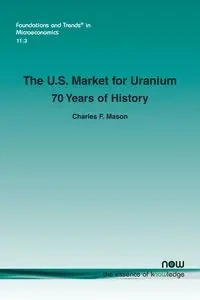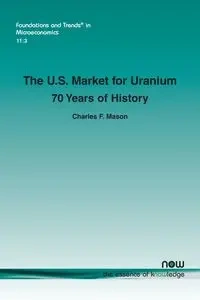The U.S. Market for Uranium - Mason Charles F.
- 70 Years of History
The U.S. Market for Uranium: 70 Years of History explores the possible inefficiencies related to the amount of exploration undertaken by private interests. With the development of atomic weapons, however, a new demand for uranium emerged. To satisfy this demand, a number of agents entered into the uranium industry, leading to a rapid expansion in exploratory efforts. For twenty years, from after the end of World War II to the mid-1960s, the only legal purchaser of uranium in the U.S. was the Atomic Energy Commission (AEC). The AEC appeared to be very interested in inducing exploration. Incentives offered to firms included construction of access roads, bonuses for initial production from a mine, and the promise of high prices in the future. At about the same time, it became understood that uranium could be used for non-military activities as well, via the production of electricity through nuclear power plants. Later, after the urge to create an ever larger arsenal of nuclear warheads abated, the desired to channel uranium into nuclear energy remained. As a result, the demand for uranium persisted, as did exploratory efforts.
The monograph is structured to facilitate investigation of these questions. Chapter 2 discusses various features from the history of the uranium industry. These features include US government involvement, industrial structure, the nature of exploration and production costs, the outcome of exploration, and prices. The theoretical underpinnings for the discussion are considered in chapter 3. The models presented provide the framework for the empirical investigation undertaken later in the monograph. Chapter 4 formulates a Bayesian learning model appropriate for describing how exploration information might be used in conjunction with the earlier model.
Some relevant institutional facts about the uranium industry are also presented in chapter 4. Drawing from these chapters, the monograph addresses the central question in chapter 5 -- was exploration conducted at socially efficient levels? If not, what were the departures and did they change over time – particularly when the central use of uranium shifted input into weapons manufacturing to input into power generation? Chapter 6 provides a summary and discussion of policy implications.
EAN: 9781680833829




The U.S. Market for Uranium: 70 Years of History explores the possible inefficiencies related to the amount of exploration undertaken by private interests. With the development of atomic weapons, however, a new demand for uranium emerged. To satisfy this demand, a number of agents entered into the uranium industry, leading to a rapid expansion in exploratory efforts. For twenty years, from after the end of World War II to the mid-1960s, the only legal purchaser of uranium in the U.S. was the Atomic Energy Commission (AEC). The AEC appeared to be very interested in inducing exploration. Incentives offered to firms included construction of access roads, bonuses for initial production from a mine, and the promise of high prices in the future. At about the same time, it became understood that uranium could be used for non-military activities as well, via the production of electricity through nuclear power plants. Later, after the urge to create an ever larger arsenal of nuclear warheads abated, the desired to channel uranium into nuclear energy remained. As a result, the demand for uranium persisted, as did exploratory efforts.
The monograph is structured to facilitate investigation of these questions. Chapter 2 discusses various features from the history of the uranium industry. These features include US government involvement, industrial structure, the nature of exploration and production costs, the outcome of exploration, and prices. The theoretical underpinnings for the discussion are considered in chapter 3. The models presented provide the framework for the empirical investigation undertaken later in the monograph. Chapter 4 formulates a Bayesian learning model appropriate for describing how exploration information might be used in conjunction with the earlier model.
Some relevant institutional facts about the uranium industry are also presented in chapter 4. Drawing from these chapters, the monograph addresses the central question in chapter 5 -- was exploration conducted at socially efficient levels? If not, what were the departures and did they change over time – particularly when the central use of uranium shifted input into weapons manufacturing to input into power generation? Chapter 6 provides a summary and discussion of policy implications.
EAN: 9781680833829

